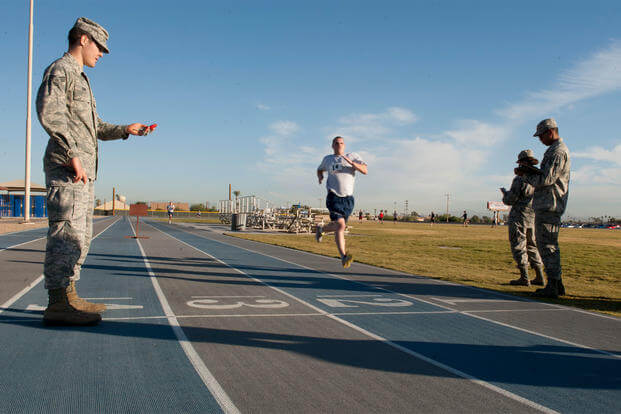Could the Air Force implement a new policy requiring troops to be ready for a physical fitness assessment at all times, pop-quiz style? It's one of several ideas proposed by the Air Force scientist instrumental in creating the current PFA.
Dr. Neal Baumgartner, chief of the Air Force Exercise Science Unit at Joint Base San Antonio-Randolph, Texas, told Military.com he's interested in having in place the most reliable assessment of fitness -- and reducing pain and frustration wherever possible. He's gathering feedback on proposals aimed at making testing less of an ordeal, including randomized testing, longer time between tests for the super-fit, and measures to reduce anxiety around test-time.
While Baumgartner said the current testing regime is generally working well, he's bothered by what he calls "five-and-a-half month wonders:" troops who don't worry about their health and fitness until their semi-annual PFA is right around the corner.
One proposal Baumgartner believes could reduce testing resources while discouraging airmen from "cramming" fitness ahead of a scheduled test is randomization -- administering a lower number of tests to the force at random, forcing troops to remain ready.
"Random testing has a big positive in that it enhances accountability," he said. "You never know when the policeman may come around the corner."
Baumgartner added that troops could be exempted from being called up for random testing after a deployment, or within a certain time frame after taking a previous test. The objective, he said, it not to catch more airmen out, but to discourage those who spend most of the year out of regulations and then take unhealthy steps to prepare at the last minute.
"[People say], 'I can't wait until the last two weeks of the year to start getting fit for the test,'" he said. "The goal is consistency."
That said, the Air Force does not appear to have a significant percentage of airmen at risk. As of the end of March 2019, 98.2% of the active-duty Air Force had a passing score on the fitness assessment, Capt. Carrie Volpe, an Air Force spokeswoman, told Military.com.
That means roughly 6,000 airmen, out of the active force of 332,800, did not pass, with more squeaking by on the margins.
Fewer Tests for PT Stars
For those at the other end of the spectrum, Baumgartner proposes letting top-scoring airmen go longer between PFAs. In feasibility testing is a proposal that would determine the time gap between fitness tests for airmen by their previous scores, with greater gaps associated with higher scores.
This initiative would further a 2010 Air Force policy change that allowed airmen who scored a 90 or above in all fitness components to take the PFA annually, rather than twice a year, as an incentive to maintain a high rate of fitness.
The thinking, he said, is that those who score in the highest percentages on the PFA are those who exhibit the healthy habits and behaviors the Air Force is looking for year-round; they don't need much evaluation or prodding. And even if a top-scorer did the unlikely, and started habitually gorging on Cheetos and beer immediately after finishing the PFA, Baumgartner reasons it would take some time before they found themselves at risk of failing the test.
"What if one of those 96 [scorers] decided to become a couch potato?" he said. "How long would it take before they went from a 96 to a failing level? It's probably going to take more than a year."
The current Air Force fitness assessment includes an abdominal circumference measurement, 1.5-mile times run, and times test to complete as many pushups and situps possible within one minute. All four components must be completed within a three-hour window in a single day.
"Hey Airman John Doe, because you score a 95, how about you don't have to test for another 18 months," Baumgartner said. "They're incentivized by that idea."
For those who do dread the test itself, Baumgartner is also proposing a change that may reduce testing anxiety.
He suggested that airmen might be able to take a pressure-free pretest, scheduled in advance with designated proctors, ahead of their set mandatory PFA. Failure of this pretest would have no negative consequences; but a passing score would count for that testing cycle.
"We know from the literature that when consequences are removed, people tend to do slightly better," Baumgartner said. "We bounced it off some airmen of all different scores, and the overall feedback is very positive."
If airmen schedule pretests in coordination with other PFAs, he said, it won't require any additional labor or resources to facilitate them.
Any improvements and changes, Baumgartner stressed, must be made with an eye to staying resource-neutral -- not increasing the time it takes to administer tests or the required equipment or manpower.
He also emphasized that the current test works as-is, although his office is always seeking improvements. Right now, they're assessing feasibility and collecting feedback on the various proposals.
"If a plane can fly from A to B and do its job, we're happy to consider one that can do it better," he said. "However, it doesn't mean the current plane is broken."
-- Hope Hodge Seck can be reached at hope.seck@military.com. Follow her on Twitter at @HopeSeck.














